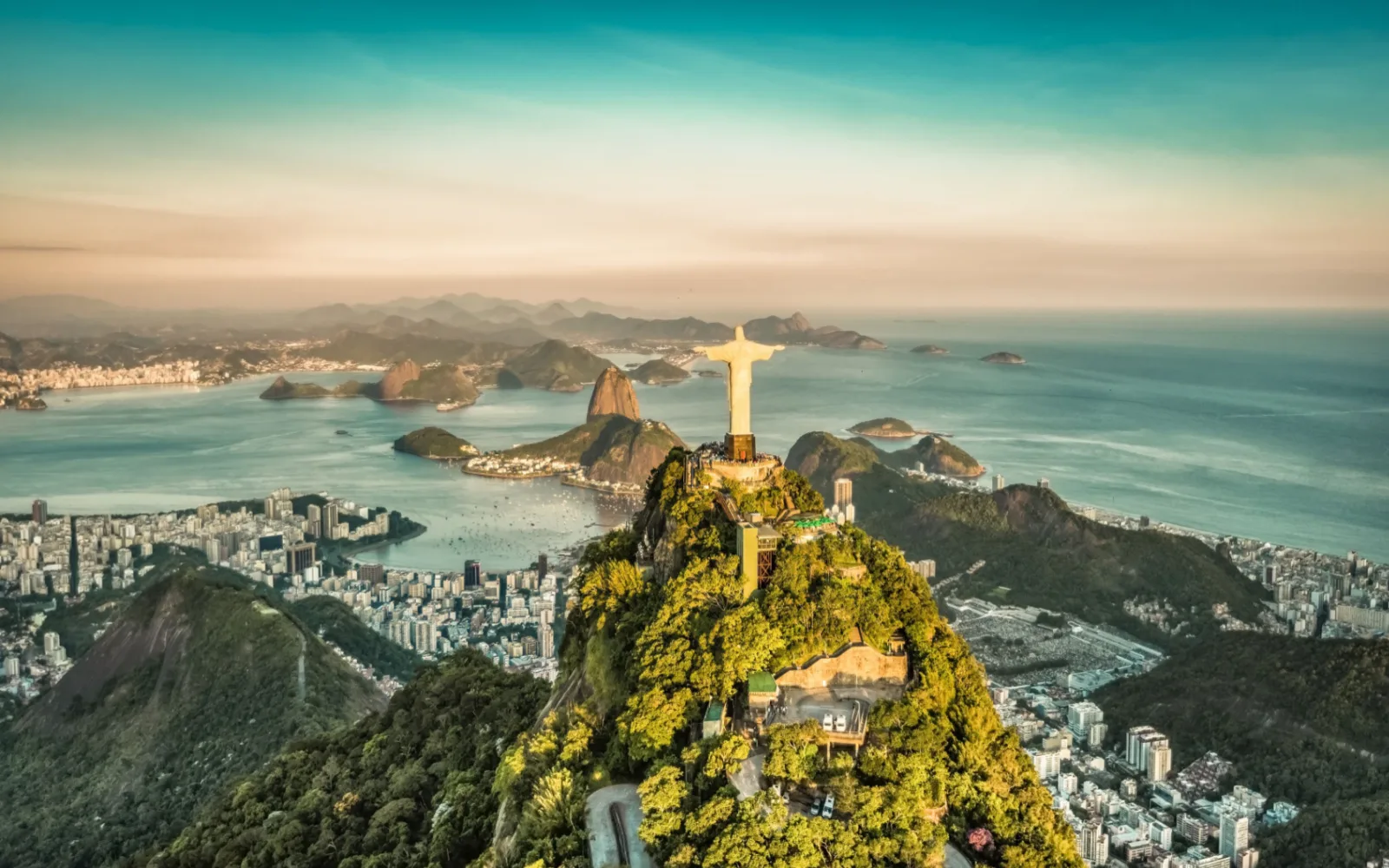Is Brazil safe to visit?
Brazil poses safety challenges due to its higher crime rates, including theft, robbery, and violent crimes. Many governments advise increased caution for travelers, but millions visit safely each year. While safety concerns exist, staying informed, taking precautions, and avoiding risky areas can make Brazil a safe destination for visitors.
Amazing Brazil is a travel destination that seems as if it was dreamed up in paradise. The pristine beaches along the country’s coastline with their sandy shores, blue waters, and hedonistic culture famous worldwide are certainly a major draw.
Brazil is a vast country with so much more than beaches to offer. Head inland, and you’ll hit the Amazon Rainforest, one of the planet’s most important ecosystems.
Visit the cities like the world-famous Rio de Janeiro for a glimpse of some of the wonders of the world, lively street culture, especially during carnival, and delicious food.
But while this storied country is rich in history, culture, and amazing architecture, is Brazil safe to visit? Here’s our take.
Is Brazil Safe to Visit in 2025?
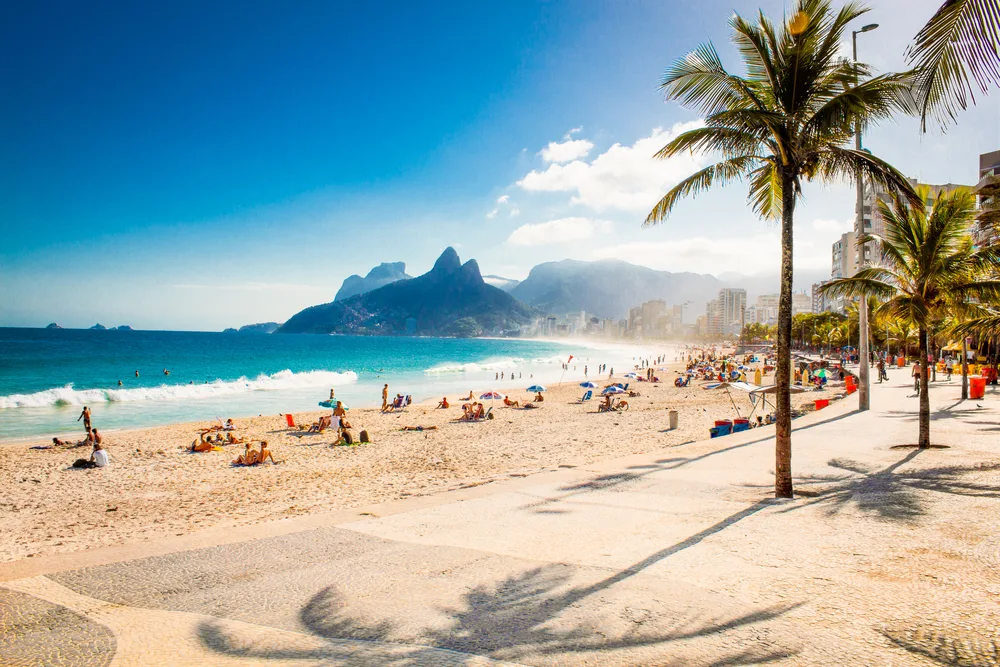
Aleksandar Todorovic/Shutterstock
Yes. Brazil is safe to visit, but you have to exercise much more caution than you would in some other tourist destinations.
Due to high levels of crime, such as theft, mugging, and even kidnapping, as well as the risk of civil unrest, many governments advise their citizens to exercise increased caution when visiting Brazil.
That being said, millions of visitors visit Brazil every year without any problem. Many governments have travel advisories in place for their citizens who want to visit Brazil. Australia urges its citizens to exercise a high degree of caution when traveling to Brazil.
Other countries have advisories of a similar level in place due to Brazil’s high crime rates. According to World Bank statistics, the crime rate in 2020 was 22.45 homicides per 100,000 people, which is high. A lot of governments also have region-specific travel advisories in place.
For example, the U.S. State Department has Level 4: Do Not Travel advisories in place for any areas within 100 miles of Brazil’s land borders except Foz do Iguaçu and Pantanal National Parks, Brasilia’s administrative regions, and any favelas.
These regions are prone to even more crime than the rest of Brazil. The biggest danger tourists have to worry about is crime of all levels. Petty crime such as pickpocketing, bag snatching, and scams are common all over Brazil.
There is no “safe” part of the country as thieves even operate in popular tourist attractions and on hiking trails. For some unlucky tourists and Brazilians, pickpockets are the least of their problems. Violent crime ranging from armed robbery to homicide is sadly common in Brazil.
Common problems people worry about when planning a trip to Brazil include:
- Pickpocketing
- Armed robbery
- Carjacking
- Kidnapping
- Homicide
- Political unrest
- Natural disasters
Recently, many governments advised their citizens to exercise caution when traveling to Brazil due to the potential for political arrest.
On January 8th, supporters of former President Bolsonaro violently stormed government buildings to call for the removal of current President Lula, who defeated Bolsonaro in an election in 2022.
Although the unrest was quickly put down, the potential for more demonstrations still exists. With all of these advisories and uncertainties, you might be wondering why people travel to Brazil at all.
However, these advisories are not there to put you off traveling but to advise you to be careful. Plus, you have to remember that Brazil is a massive country. For example, unrest in a favela in one city won’t affect your small-town beach vacation.
Crime in Brazil
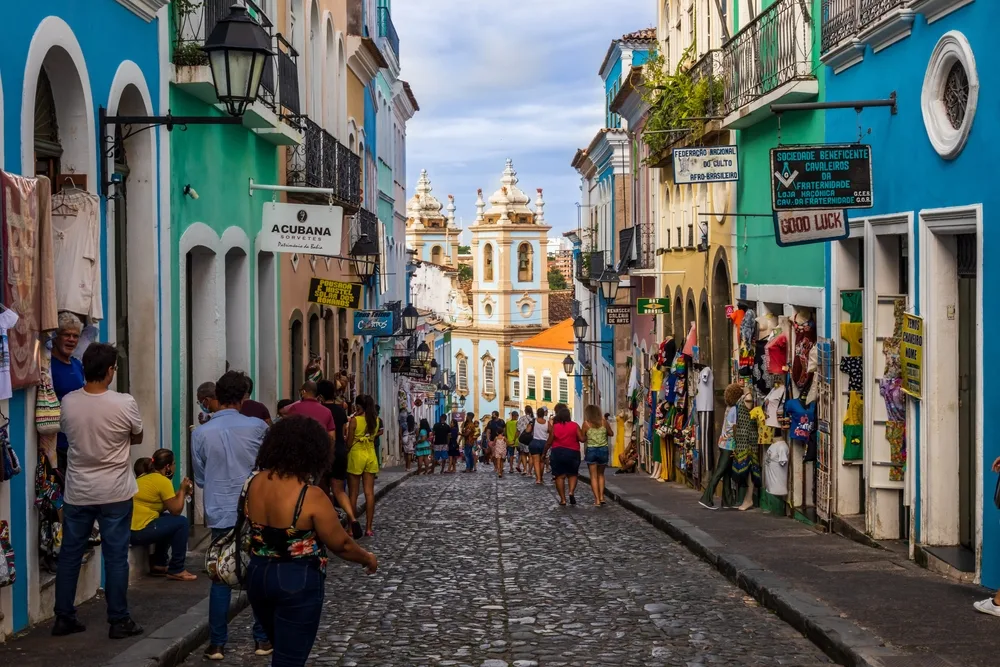
Salvador – Bahia – Brasil – JAN 05 2022: Architectural ensemble of the pillory in Salvador/Luis War/Shutterstock
When you go to Brazil, it definitely pays to be careful of crime. The crime rate in the country is, unfortunately, very high. It has the 9th highest rate of crime in the world. Much of that crime rate includes violent crime, such as homicide, kidnapping, and assault.
With such a high rate of violent crime, you might be wondering why people bother going to Brazil at all, but tourists are less likely to be victims of violent crime than locals.
Although Brazil has a high rate of gun violence and violent crime, these crimes are usually targeted or part of gang wars.
The people who get caught in the crossfire are usually poor Brazilians living in neighborhoods on gang turf, not wealthy tourists. Theft is a big problem in Brazil, one that affects locals and visitors alike.
According to Statista, 50% of the Brazilian population has had a phone stolen. Thieves use techniques such as dragnet robberies, when a group of thieves floods an area to lift wallets, phones, and jewelry, to commit their crimes.
Crime in Brazil might be more prevalent than it is in your hometown, but taking some simple precautions can help you keep yourself and your valuables safe.
Take care about how and where you move around in the country, avoiding isolated and dangerous areas. Keep valuables close to your body, and try not to stand out.
Theft
Theft is the most likely crime that you might experience while in Brazil. According to Knomeo, the robbery rate per 100,000 people in Brazil is a whopping 695.8 incidents!
Pickpocketing is very common, especially at popular tourist attractions such as Ipanema Beach or Copacabana. Theft can occur everywhere, from good neighborhoods to bad ones, from public transportation to remote hiking trails.
The best way to protect your valuables is to avoid putting them in a position where they can be robbed. Leave valuables, including your passport, at your accommodation, and only carry around copies of your documents.
Don’t flash valuables such as phones or watches. Always have a stash of cash somewhere else, such as your sock, so you can take a taxi back to your accommodation if you get robbed.
Some thieves prefer to use deception instead of violence to get what they want, so beware of common scams. One is the Good Samaritan scam, when someone offers to help you out but is really trying to rob you.
Scammers and pickpockets sometimes work in pairs, so be careful of distractions on the street, even children. Exercise caution when using ATMs as well. Sometimes scammers put card skimmers in ATMs.
Others wait for tourists to take out large amounts of cash from an ATM, then “express kidnap” them or hold them until they empty their bank cards. Only use ATMs inside buildings such as banks, never ones that are on the street.
Put your money away quickly instead of flashing it around. While most incidents of theft that tourists experience are simple bag snatching and pickpocketing, violent thefts such as muggings and carjacking do happen.
When you take a taxi at night, you’ll probably notice drivers speeding through red lights to avoid carjacking. Always keep your doors locked and windows closed while in a car, even a taxi.
Gang Violence and Violent Crime
There are a few reasons why Brazil has such a high rate of violent crime. One is the stark income inequality in the country, which is often visible in the cities as favelas rub up against wealthy neighborhoods.
There are a lot of desperate, impoverished people who need to find a way, any way, to get by. Another is the prevalence of organized crime. Favelas, or informal slums, are often governed by rival gangs to the point that police have no jurisdiction there.
Organized crime lords control the drug trade, human trafficking, and other illegal activities, especially across Brazil’s land borders with neighboring South American countries.
These gangs are the ones behind Brazil’s high violent crime rate. The “good” news is that most incidents don’t affect tourists (this isn’t exactly good news for local Brazilians, especially poor residents of favelas who are often targets of both gang and police violence).
There are incidents where tourists have been victims of violent crimes, mostly express kidnappings and armed robberies. Nothing can protect you with 100% certainty, but avoiding unsafe areas can do a lot to minimize your risk of becoming a victim of violent crime.
Avoiding Bad Areas
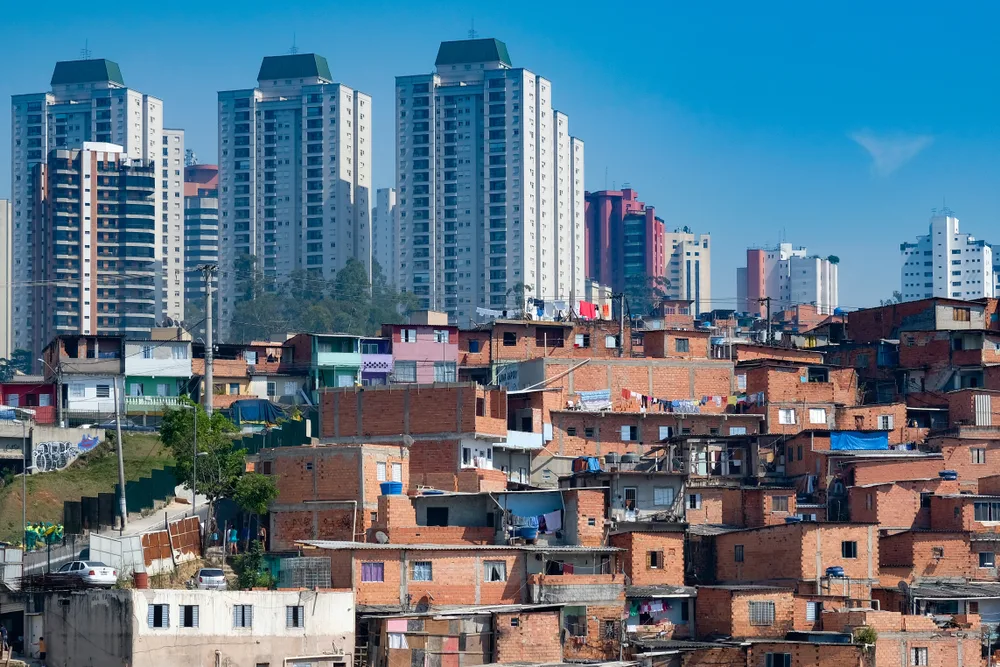
Yannick Martinez/Shutterstock
While crime can occur anywhere in Brazil and thieves often target wealthy neighborhoods and tourist attractions, you can still do a lot to minimize your risk of being a victim of violent crime by avoiding bad areas.
One way to get a feeling for which areas are dangerous is to look at government advisories. Many governments, including the United States, advise visitors against visiting places within 100 miles of Brazil’s land borders with Peru, Venezuela, and other neighboring countries.
The borders are prime areas for trafficking of all sorts, and the crime rate around them is very high. Brazil’s major cities have favelas, or shantytowns, where poor people live.
These informal settlements have high rates of violent crime and low levels of police intervention. Recently, favela tours are becoming popular as a form of poverty tourism.
If you venture into a favela, only do so on an organized tour and with the knowledge that no tour operator can guarantee your safety. There are specific neighborhoods you should avoid in different cities.
In São Paulo, avoid the so-called red light districts of Rua Augusta and Estação da Luz. In Rio de Janeiro, the most notorious neighborhoods are located around Zona Sul and on Linha Vermelha. Some main tourist attractions are also dangerous for tourists.
When visiting Corcovado Mountain, take a train or shuttle as robbers lurk on the hiking trails. The beaches are also full of crime, so don’t bring any valuables when you go swimming.
Older tourist advice says that Brasília, besides its administrative districts, is safer to visit due to its lower crime rate. However, as of early 2023, many governments advise against traveling to the capital due to higher rates of political unrest.
Frequently Asked Questions
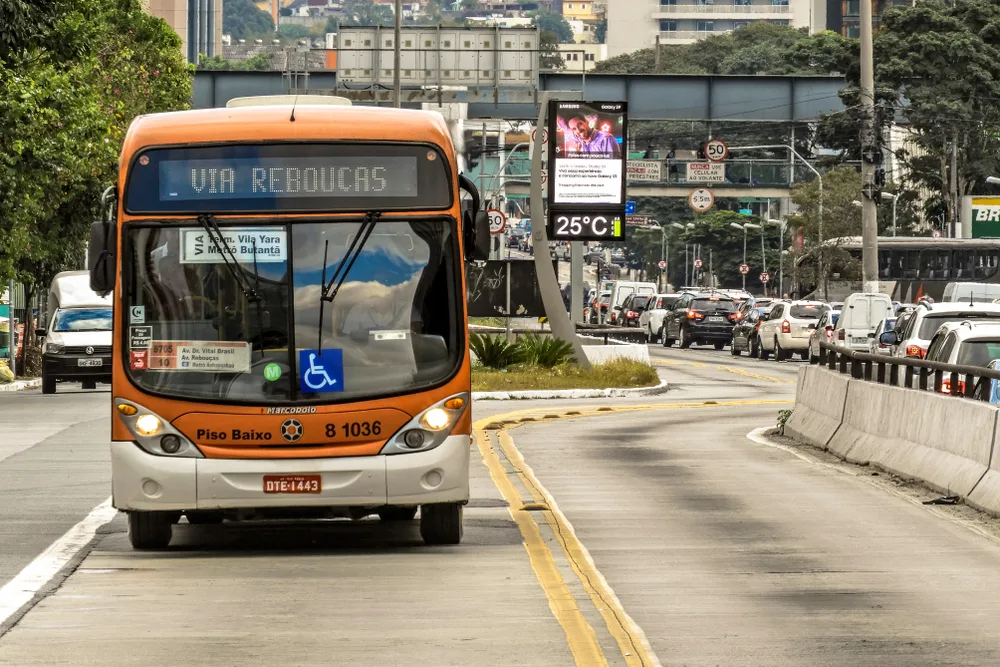
Sao Paulo, Brazil, June 13, 2018. Bus traffic and taxis in the exclusive bus corridor of Reboucas Avenue, west of Sao Paulo/Alf Ribeiro/Shutterstock
Here are some other questions fellow travelers wanted to know the answers to:
What to Avoid Doing in Brazil?
Knowing what to avoid doing in Brazil can help you avoid becoming the victim of a crime. Avoid behavior that puts you at risk, such as walking around alone at night or visiting dangerous areas. Don’t bring attention to yourself by flashing valuables or carrying lots of cash.
How Safe is Rio de Janeiro for Tourists?
Rio de Janeiro is not the safest for tourists due to high levels of crime. However, most of these crimes are petty crimes of opportunity. You can still enjoy all the attractions Rio has to offer; just avoid the north end of the beach, which is sketchier, and don’t carry lots of cash.
Is Brazil Safe for Female Tourists?
Female tourists are exposed to the same dangers as male tourists, such as theft and mugging. The rates of sexual assault against tourists are not very high, but rape and assault do happen. If you do visit Brazil as a female traveler, you’ll want to take additional safety precautions.
Is Brazil a Safe Travel Destination?
Brazil is a beautiful travel destination, but it is not the safest. That being said, you are at high risk of being robbed but not of being killed or wounded, so it’s not the most dangerous travel destination in the world.
What is the Biggest Problem in Brazil?
The biggest problem in Brazil is probably wealth inequality. This problem is at the root of Brazil’s other problems, from crime to environmental degradation.
Book Your Trip to Brazil Today!
| 📈 Murder rate | 22.45 per 100k (2020) |
| 👮♂️ Most common crime | Petty theft |
| 🏠 Worst neighborhood | Any favela |
| ❓ Safety tip | Use extreme caution |
Visitors to Brazil have a higher risk of being victims of theft than in most other places. However, taking some precautions can minimize your risk. The country has so much to offer it would be a shame to miss out. Happy travels!



